Discover the STAPLES Project’s Year 1 Highlights

The first year of the STAPLES project marked an important step in understanding food system vulnerabilities and identifying opportunities for resilience in the MENA region. From analysing trade flows and mapping traditional cereals to engaging stakeholders and preparing in-depth fieldwork, the project has laid a solid foundation for future action. In this article, we present […]
What’s out there? Reviewing dashboards and data platforms for cereal supply chain monitoring and management

The STAPLES project is designing two digital tools—a Dashboard and a Decision Support System (DSS)—to support cereal supply chain monitoring and management in the MENA region, with a focus on Egypt and Morocco. These tools aim to assist public and private stakeholders in coping with challenges linked to global supply chain disruptions. One of the […]
STAPLES Project: : Experts Tackling Food Security & Trade Resilience in MENA
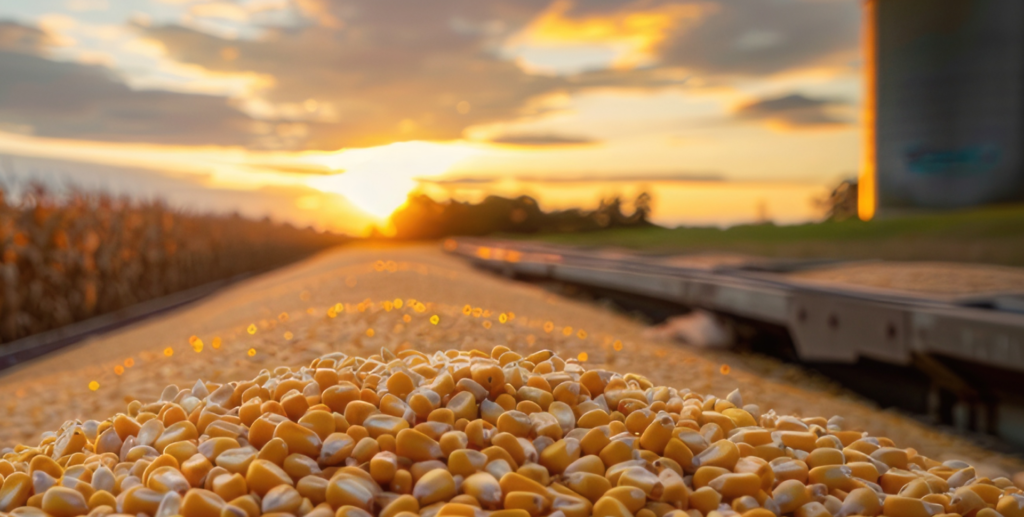
Food Security in MENA. Challenges, Solutions & Expert Insights: an interview with the University of Gastronomic Sciences (UNISG) Food security is a critical issue across the Middle East and North Africa (MENA) region, where global crises have exacerbated existing vulnerabilities. Many countries in the region, particularly Egypt and Morocco, are highly dependent on cereal imports, […]
STAPLES on Egyptian Cabinet Information and Decision Support Center IDSC
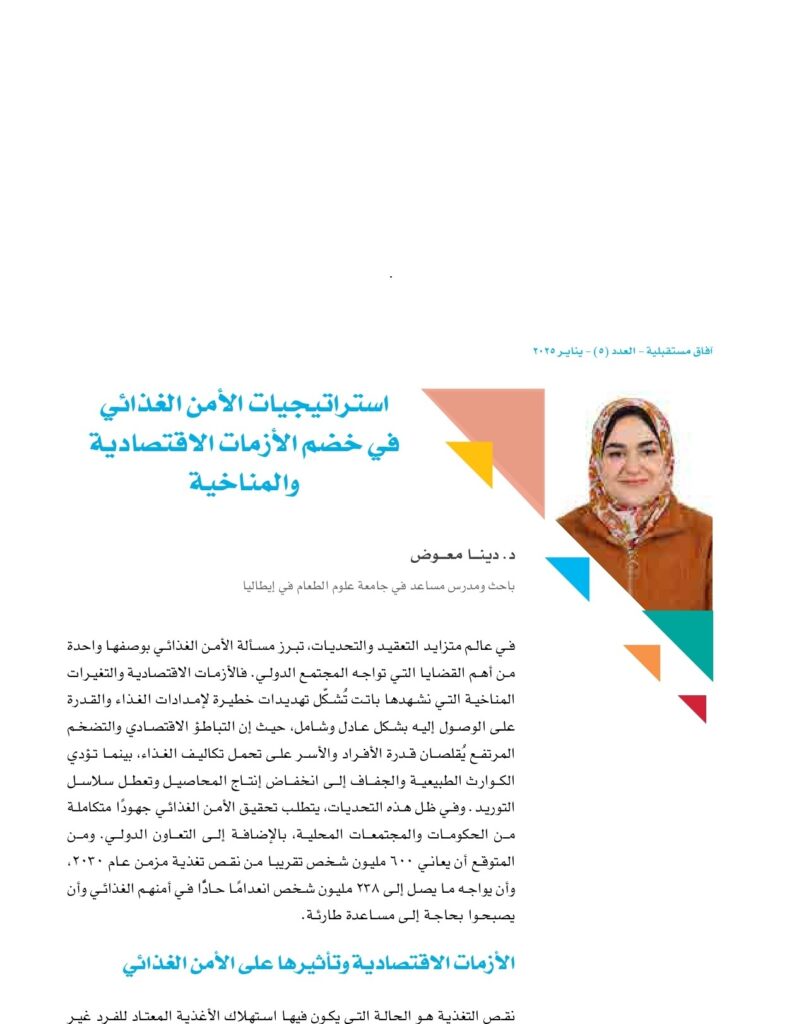
STAPLES is is featured in on the Future Prospects- Issue 5 (January 2025) of مركز المعلومات ودعم اتخاذ القرار بمجلس الوزراء – Egyptian Cabinet Information and Decision Support Center IDSC, a prestigious publication featuring insights from leading experts and researchers, analysing key political, economic, social, and technological trends at global and regional levels. Dina Moawad’s, within […]
STAPLES presented at the 4th Fez Meknes Economic Forum
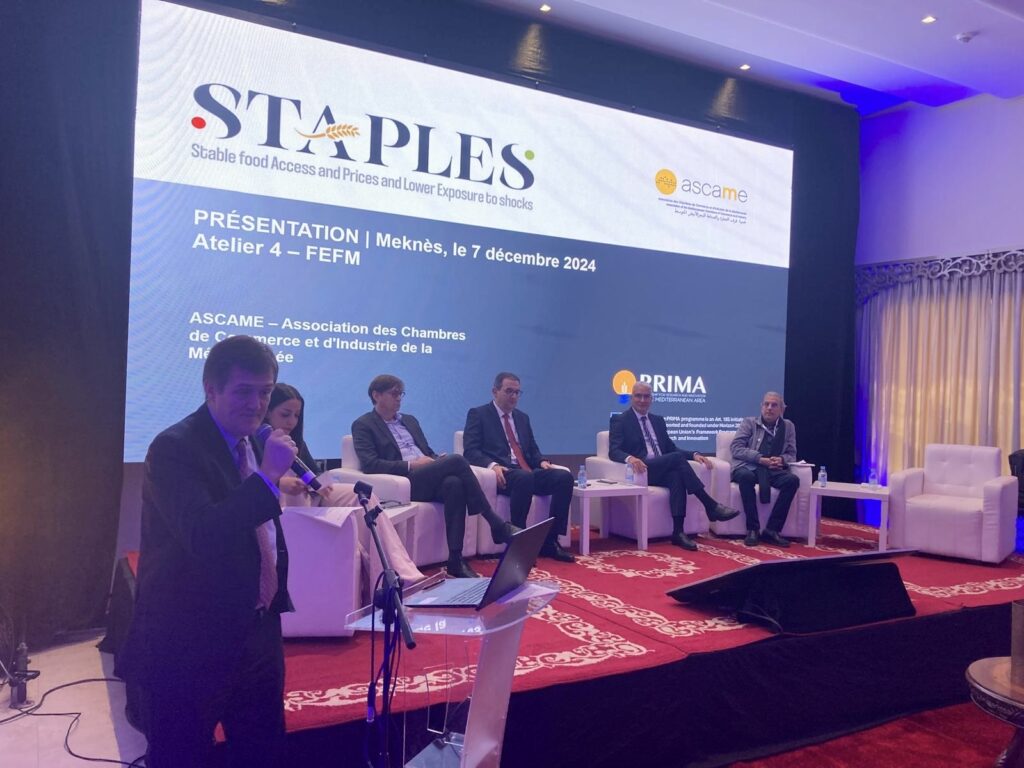
STAPLES Project was presented by the 𝗙𝗲𝘇 𝗠𝗲𝗸𝗻𝗲𝘀 𝗘𝗰𝗼𝗻𝗼𝗺𝗶𝗰 𝗙𝗼𝗿𝘂𝗺 by the partner ASCAME-Association of Mediterranean Chambers of Commerce and Industry -under the theme “𝗛𝗼𝗿𝗶𝘇𝗼𝗻 𝟮𝟬𝟯𝟬: 𝗘𝗰𝗼𝗻𝗼𝗺𝗶𝗰 𝗗𝘆𝗻𝗮𝗺𝗶𝗰𝘀-𝘗𝘦𝘳𝘧𝘰𝘳𝘮𝘢𝘯𝘤𝘦 𝘰𝘧 𝘵𝘩𝘦 𝘈𝘨𝘳𝘰 I𝘯𝘥𝘶𝘴𝘵𝘳𝘪𝘢𝘭 𝘚𝘦𝘤𝘵𝘰𝘳: 𝘐𝘯𝘯𝘰𝘷𝘢𝘵𝘪𝘰𝘯 & 𝘝𝘢𝘭𝘰𝘳𝘪𝘻𝘢𝘵𝘪𝘰𝘯.” ASCAME was one of the partners of this edition organized by the CCIS Fès-Meknès and the Foundation Forum Économique Fès-Meknès from December […]
Emerging Economies in Global Value Chains: Spotlight on STAPLES
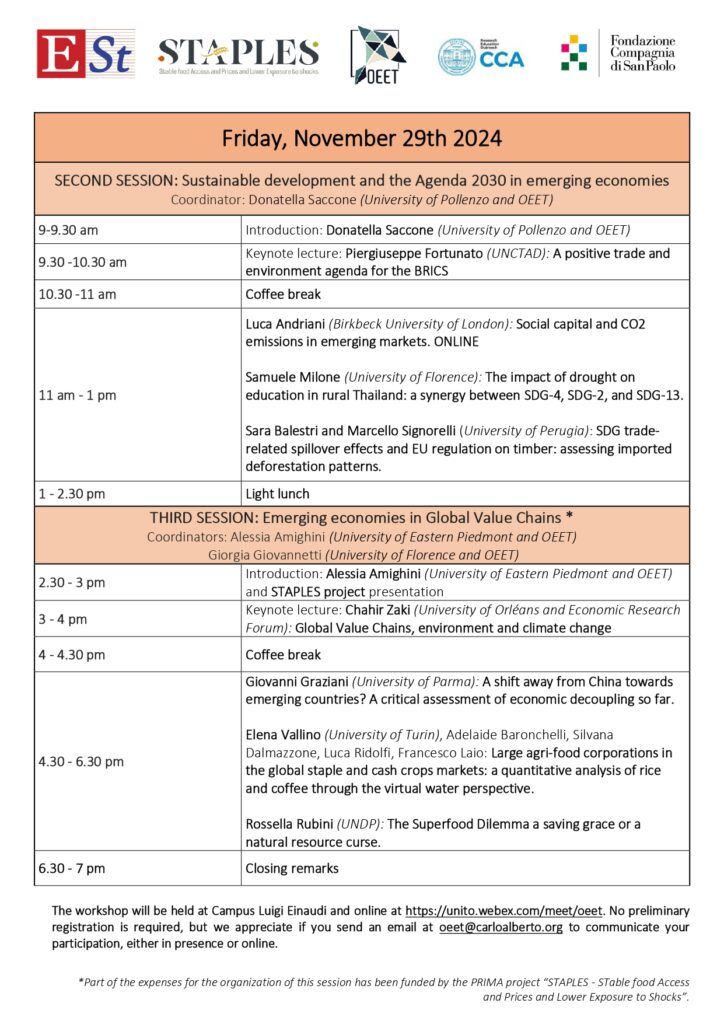
On November 29th, the STAPLES project featured at the event “10 Years of the Turin Centre on Emerging Economies: Lessons Learned and Perspectives for the Future”, organized by the OEET (Osservatorio Economie Emergenti di Torino) in partnership with Collegio Carlo Alberto (CCA), the Department of Economics and Statistics “Cognetti De Martiis,” and Fondazione Compagnia di […]
Plenary meeting 5 novembre
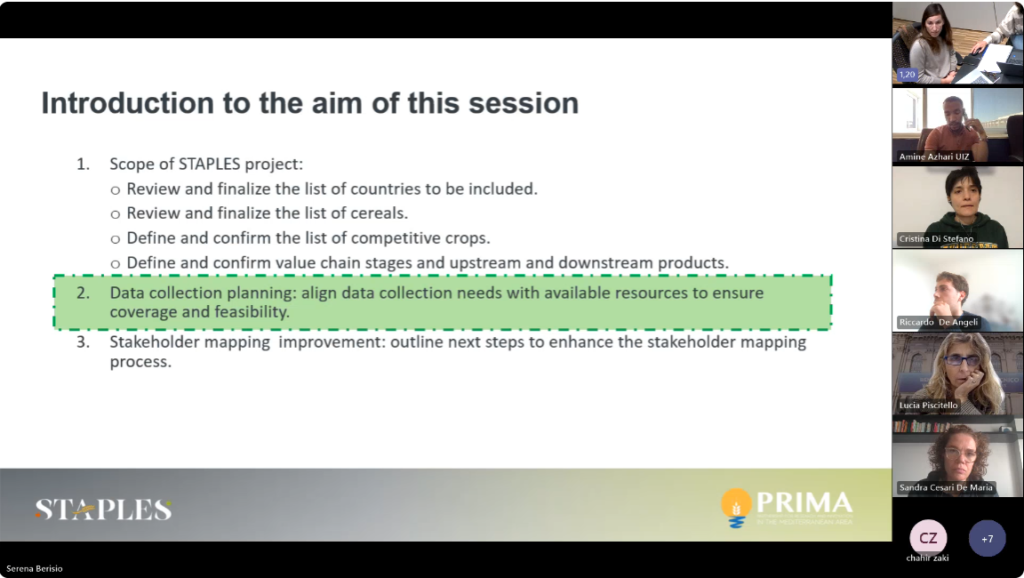
EVENT: STAPLES PLENARY MEETING November 5, 2024 – half-day plenary meeting of the STAPLES project The first half-day plenary meeting of the STAPLES project convened on November 5, gathering project partners to discuss key project elements. The meeting aimed to finalize detailed definitions of target countries, primary crops, and value chain stages and refining data […]
STAPLES PRIMA DAY event
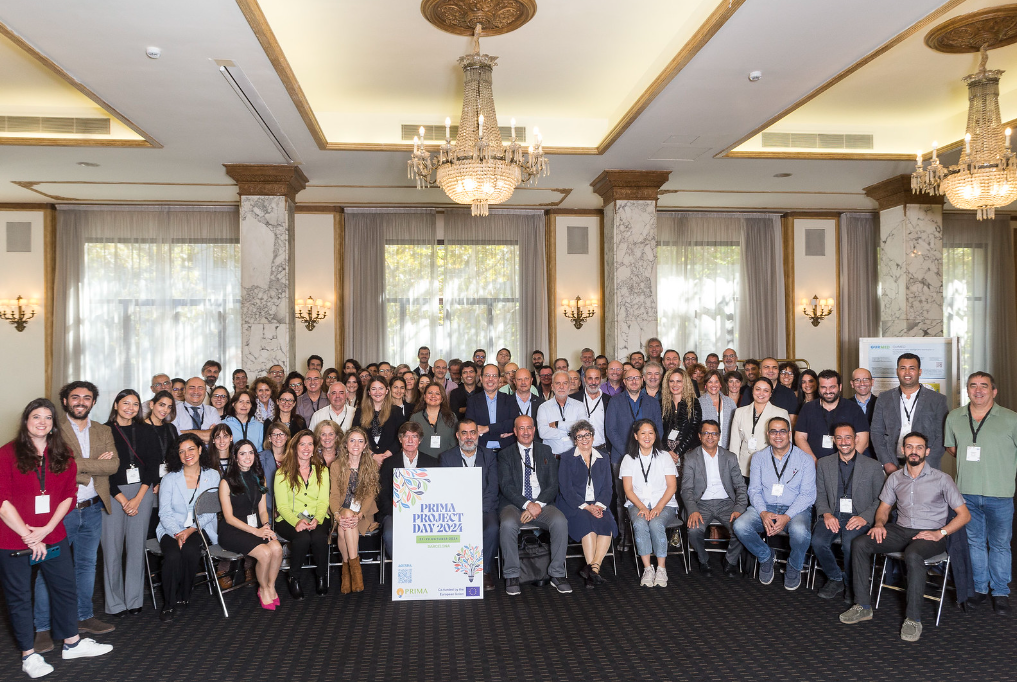
EVENT: PRIMA PROJECT DAY22-23 October 2024, Barcelona We’re excited to share that STAPLES participated in PRIMA Project Day 2024! Held on October 22-23 in beautiful Barcelona, this two-day event brought together innovative projects committed to advancing sustainability across the Mediterranean.Representing STAPLES, PhD Marta Marson joined researchers, project teams, and experts from around the region, connecting […]
STAPLES kick-off meeting
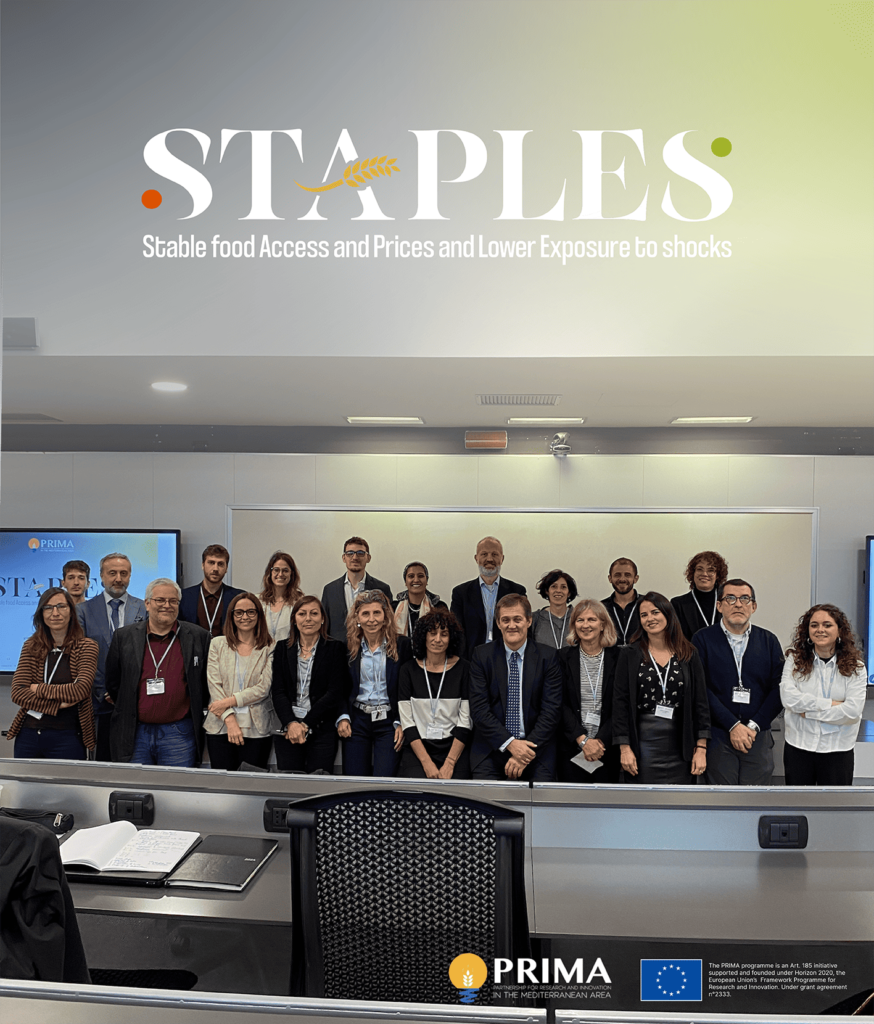
EVENT 2-3 May 2024, Politecnico di Milano We would like to recap the successful kick-off meeting of the STAPLES project, which took place some months ago at the Department of Management, Economics and Industrial Engineering of Politecnico di Milano. Though time has passed since that event, the momentum created during those two days continues to […]
Diving into STAPLES Project. Interview with PhD Researcher Marta Marson.
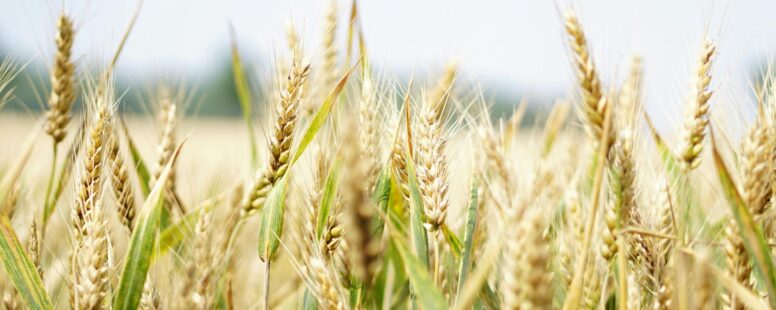
Autor credit: ASCAME The STAPLES Project came up with the aim at addressing issues related with the dependence of MENA countries on imported cereals and their consequent exposure to shocks from the value chain. Specifically, MENA countries are particularly exposed to international shocks in cereals markets because they largely rely on imports to feed their population. A […]




